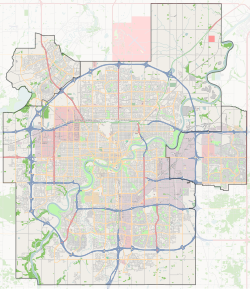Lee Ridge, Edmonton
Lee Ridge | |
|---|---|
Neighbourhood | |
Location of Lee Ridge in Edmonton | |
| Coordinates: 53°28′16″N 113°26′20″W / 53.471°N 113.439°W | |
| Country | |
| Province | |
| City | Edmonton |
| Quadrant[1] | NW |
| Ward[1] | Karhiio |
| Sector[2] | Southeast |
| Area[3][4] Community | Mill Woods Millbourne |
| Government | |
| • Mayor | Amarjeet Sohi |
| • Administrative body | Edmonton City Council |
| • Councillor | Keren Tang |
| Area | |
| • Total | 0.9 km2 (0.3 sq mi) |
| Elevation | 698 m (2,290 ft) |
| Population (2012)[7] | |
| • Total | 2,739 |
| • Density | 3,043.3/km2 (7,882/sq mi) |
| • Change (2009–12) | |
| • Dwellings | 1,057 |
Lee Ridge is a residential neighbourhood located in the Mill Woods area of south Edmonton, Alberta, Canada, named after former Edmonton mayor Robert Lee.
The neighbourhood is bounded on the east by 66 Street, the south by 34 Avenue, the west by Mill Woods Road, and the north by 38 Avenue.
The neighbourhood has a mixture of housing types: single-family dwellings (36%), row houses (29%), duplexes[8] (15%), apartments in low-rise buildings (11%) and mobile homes (9%). The average household size is 2.7, with a variety of household sizes. One in two households consist of one or two people. One in four households have four or five persons, and one in five households have three persons. Seven out of ten residences are owner occupied, and one out of three is rented. The bulk of construction in the neighbourhood occurred during the 1970s.
There is one school in the neighbourhood, Lee Ridge Elementary School.
Lee Ridge is served by the Leefield community league.[9]
Demographics
[edit]In the City of Edmonton's 2012 municipal census, Lee Ridge had a population of 2,739 living in 1,057 dwellings,[7] a -0.4% change from its 2009 population of 2,751.[10] With a land area of 0.9 km2 (0.35 sq mi), it had a population density of 3,043.3 people/km2 in 2012.[6][7]
Surrounding neighbourhoods
[edit]References
[edit]- ^ a b "City of Edmonton Wards & Standard Neighbourhoods" (PDF). City of Edmonton. Archived from the original (PDF) on May 3, 2014. Retrieved February 13, 2013.
- ^ "Edmonton Developing and Planned Neighbourhoods, 2011" (PDF). City of Edmonton. Archived from the original (PDF) on September 4, 2013. Retrieved February 13, 2013.
- ^ "The Way We Grow: Municipal Development Plan Bylaw 15100" (PDF). City of Edmonton. 2010-05-26. Archived from the original (PDF) on May 2, 2015. Retrieved February 13, 2013.
- ^ "City of Edmonton Plans in Effect" (PDF). City of Edmonton. November 2011. Archived from the original (PDF) on October 17, 2013. Retrieved February 13, 2013.
- ^ "City Councillors". City of Edmonton. Retrieved February 16, 2014.
- ^ a b "Neighbourhoods (data plus kml file)". City of Edmonton. Retrieved February 13, 2013.
- ^ a b c "Municipal Census Results – Edmonton 2012 Census". City of Edmonton. Retrieved February 22, 2013.
- ^ Includes triplexes and quadruplexes.
- ^ Bowker. Volunteers. p. 270.
- ^ "2009 Municipal Census Results". City of Edmonton. Retrieved February 22, 2013.
External links
[edit]

